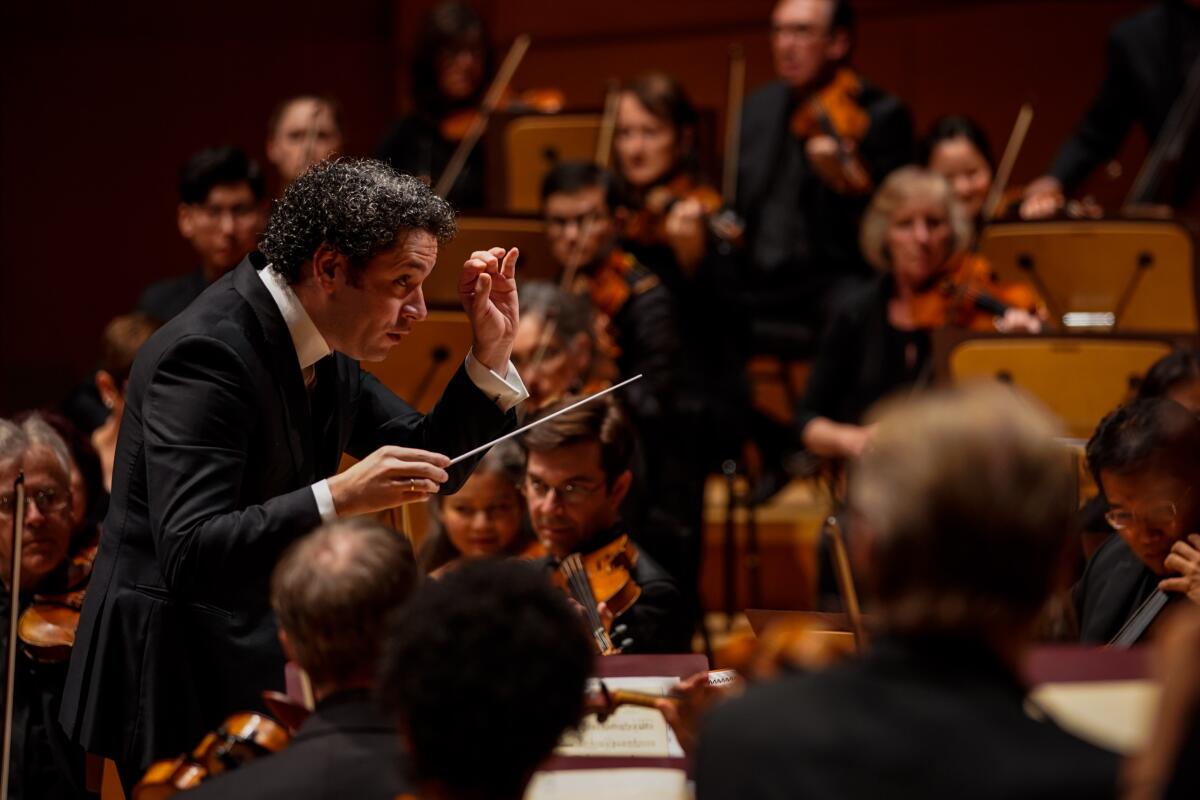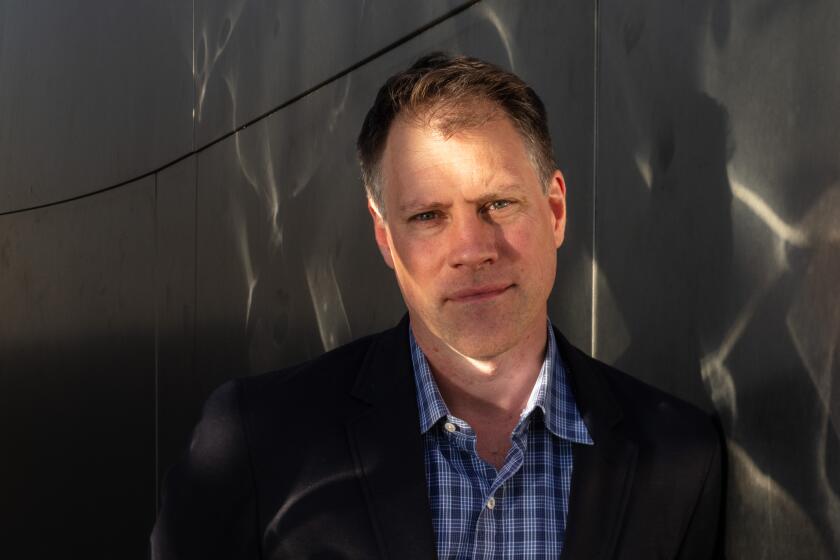Review: Gustavo Dudamel begins a new L.A. Phil season with no need for a gala

- Share via
A year ago, the Los Angeles Philharmonic opened its centennial season with all hoopla all the time. There was a daylong parade followed by a free stellar concert at the Hollywood Bowl. Walt Disney Concert Hall was illuminated with spectacular video imagery. Game-changing new music was commissioned and premiered. Pop stars, jazz stars, they all were invited to the centennial party. The city became a symphony. The orchestral world had never seen anything like it.
Well, it did see something sort of like it 10 years ago, with the media circus surrounding Gustavo Dudamel’s first concerts as L.A. Phil music director, his hosting of a free Hollywood Bowl concert and his leading of a Disney Hall gala of obsessive international interest.
Thursday night, the L.A. Phil opened its new season a week later than usual. For the first time in memory, there was no gala. There was no celebration of Dudamel’s 10th L.A. Phil anniversary. He conducted an American program that included three crowd-pleasing works. The soloists were conventional, family even. Dudamel did not even follow through with his tradition of opening the season by premiering a newly commissioned work. On paper, it appeared business as usual for any other orchestra but the uniquely venturesome L.A. Phil.
It’s a good thing concerts aren’t performed on paper. Despite appearances, this was an exceptional start of the 101st season.
The program began with Samuel Barber’s “Knoxville: Summer of 1915” featuring the kind of classical singer it was written for. The New York Philharmonic, on the other hand, just happened to include the comforting work on its first concert of its season. Only the New Yorkers took the surprising risk of inviting a Broadway star, Kelli O’Hara, whose intensity so surprised and impressed the New York Times’ Anthony Tommasini that he ended his review saying that he’s saving a place on his best-of-the-year list for her performance.
The next piece on Dudamel’s program was George Gershwin’s Piano Concerto in F, once more played as intended. (Saturday, the New West Symphony opens its season in Thousand Oaks with the striking idea of employing jazz musicians, the Marcus Roberts Trio, as soloists in the Concerto in F.)
Some of the seeming stodginess of the L.A. Phil has to do with circumstance. There will, in fact, be an only-in-L.A. gala. It has been postponed to Oct. 24 because that is the date of the first L.A. Phil concert 100 years ago. Dudamel and the two surviving ex-music directors, Zubin Mehta and Esa-Pekka Salonen, will appear together in the premiere of a piece written for the three conductors by the super-cool Icelandic composer Daniel Bjarnason.
The L.A. Phil did commission a piece for this week’s program in an effort to include former L.A. Phil Music Director André Previn in the centennary celebrations. Previn died in February, having just begun the score. So Dudamel substituted the largest of Previn’s recent orchestral works, “Can Spring Be Far Behind?” The night ended with Copland’s “Appalachian Spring.”
However unacknowledged Dudamel’s 10th anniversary might have been, this modest program was ultimately all about him. His maturation over a decade has been striking. No longer the electrifying, irrepressible 28-year-old hotshot, he has become a master capable of profundity. The excitement has become taken for granted. Depth is now what pulls you in.
And a depth of sound was evident from the very first notes, the sweet entrancing of that long-ago, idyllic “Knoxville” summer. The text comes from James Agee’s novel “A Death in the Family.” A boy dreams. Summer sounds of barking dog and streetcar enchant. With lazy memories of warm-day picnics and warm-night quilts on the grass, family all around, the music lilts. Blue notes supply poignancy.
Julia Bullock was the soprano. Although her career is still young, she is already, I think, the most compelling dramatic singer we have on the stage. Many (OK, most) love “Knoxville” and its evocations. I don’t. Though exquisite in its construction, it pries on manipulative nostalgia. But team Bullock and Dudamel went far beyond that, making notes and words speak. Somehow this no longer sounded like Barber but something intrinsically personal. For at least one listener, the performance was a miracle.
The Los Angeles Philharmonic elevates its chief operating officer to replace Simon Woods and to fill big shoes left behind by Deborah Borda.
Programming Gershwin’s Concerto in F, with Jean-Yves Thibaudet, seems almost like not trying. Not many months go by when the L.A.-based French pianist isn’t playing with the orchestra. He never lets you down, but you know what they say about familiarity. We take the flashy technique for granted, and sometimes he does too.
If your timing was right, you might have seen him tootle into the Disney garage in one of his sleek, exotic sports cars, as I happened to on Thursday. He no longer wears the red socks or much glitter onstage. On this night the glitter was reserved for his fingers.
For all Dudamel’s rhythmic sense, his exuberance and his natural way with popular idioms of all sorts, Gershwin has somehow long befuddled him. Only slowly has he found his way in. That way, unexpectedly, is a radical symphonic magnificence.
The concerto began with its timpani stokes played as though an avant-garde onslaught by Xenakis, which is to say cosmic thunder. Gershwin’s jazzy tunes took on Brahmsian weight and substance. Thibaudet, who happens to be a superb Brahmsian, little though he plays the composer these days, caught the spirit. Yet all the jazziness was there too. That’s right, Brahms rocks.
Despite that, Dudamel never got in the way of Thibaudet’s flash. The slow movement was blues of the supplest kind. The final Allegro was sheer adrenaline. It was a great performance.
Previn’s “Spring,” written three years ago, has the quality of an incomparable raconteur’s ramble, a kind of improvisation for orchestra by a once-great improviser. He put in bits of his Hollywood days. He turned small thematic motifs around the way he did fooling around at the piano, and the way he could in conversation. The past sounded like it was flooding in. The orchestral treatment, little solos coming in and out, were the work of a natural. Previn didn’t worry about whether he had something to say, he just said.
Previn did have something to say at the end. His final work, “Penelope,” completed on his deathbed, is a substantial setting of a powerful Tom Stoppard text for Renée Fleming, string quartet and piano. The soprano gave the premiere in Tanglewood this summer. It is a masterpiece. Fleming comes to town next week to appear with Los Angeles Opera. Unfortunately, she hasn’t managed to fit “Penelope” into her visit.
Just as Dudamel’s Gershwin isn’t Gershwin’s super-smooth Gershwin, his “Appalachian Spring” isn’t Copland’s clear-and-cool-as-a-mountain-stream Copland. Dudamel finds his own extremes of mystical calm and vibrant dance. No parade required.
Los Angeles Philharmonic
Where: Walt Disney Concert Hall, 111 S. Grand Ave., L.A.
When: 8 p.m. Friday and Saturday, 2 p.m., Sunday
Tickets: $72-$237
Info: laphil.com
More to Read
The biggest entertainment stories
Get our big stories about Hollywood, film, television, music, arts, culture and more right in your inbox as soon as they publish.
You may occasionally receive promotional content from the Los Angeles Times.












